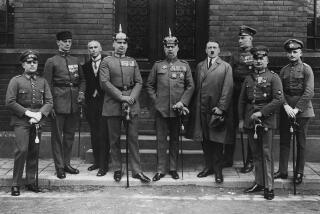Make Pinochet Face His Past
- Share via
Justice demands that dictators who trample the human and legal rights of their fellow citizens or foreign nationals should ultimately answer to the law. This is the lesson of the ruling by Britain’s highest court denying immunity from prosecution for Augusto Pinochet, Chile’s former strongman.
The atrocities committed by the Chilean army after Pinochet’s 1973 coup d’etat ousted the constitutionally elected government of Salvador Allende have been amply documented. Crooked politics and strong-arm tactics allowed the dictator literally to get away with murder at home. His case remains a cruel model of the impunity with which military leaders have ruled in Latin America.
For Pinochet, that shield began to crumble on Oct. 16, the day the 83-year-old Chilean senator was preparing to leave a London clinic where he had been receiving medical treatment. British officials arrested him on a warrant from Spanish judge Baltazar Gracian, who demanded that the old dictator be extradited to Madrid to stand trial for the deaths and disappearances of more than 3,000 people under his brutal regime, including a number of Spanish citizens.
Gracian based his extradition request on nine separate international conventions and agreements dealing with crimes against humanity, highlighting the growing support for justice on an international footing.
Legal wrangling in Santiago, London and Madrid continued for weeks, with Britain’s highest court finally ruling last Wednesday that no diplomatic agreements or niceties could shield the man whose name still evokes terror in Chile. Britain’s law lords, sitting as the highest court in the land, ruled 3 to 2 that Pinochet enjoys no immunity from prosecution as a former head of state in a matter of gross human rights abuses. The decision to accede to Spain’s request for Pinochet’s presence in a Spanish court now rests with British Home Secretary Jack Straw, who must decide whether to release Pinochet or proceed with the extradition process.
Justice will be served if the former dictator is sent to Madrid to face his accusers.
An unfortunate voice in this bitter legal struggle was that of former British Prime Minister Margaret Thatcher, who argued for Pinochet’s release and reminded the justices that he supported the British in the Argentinian invasion of Britain’s Falkland Islands in 1982. Thatcher is wrong. She knows the toll that the dictator’s soldiers took in repressing opposition to his rule. This matter now stands where it should, in the judicial processes among nations.
More to Read
Sign up for Essential California
The most important California stories and recommendations in your inbox every morning.
You may occasionally receive promotional content from the Los Angeles Times.










